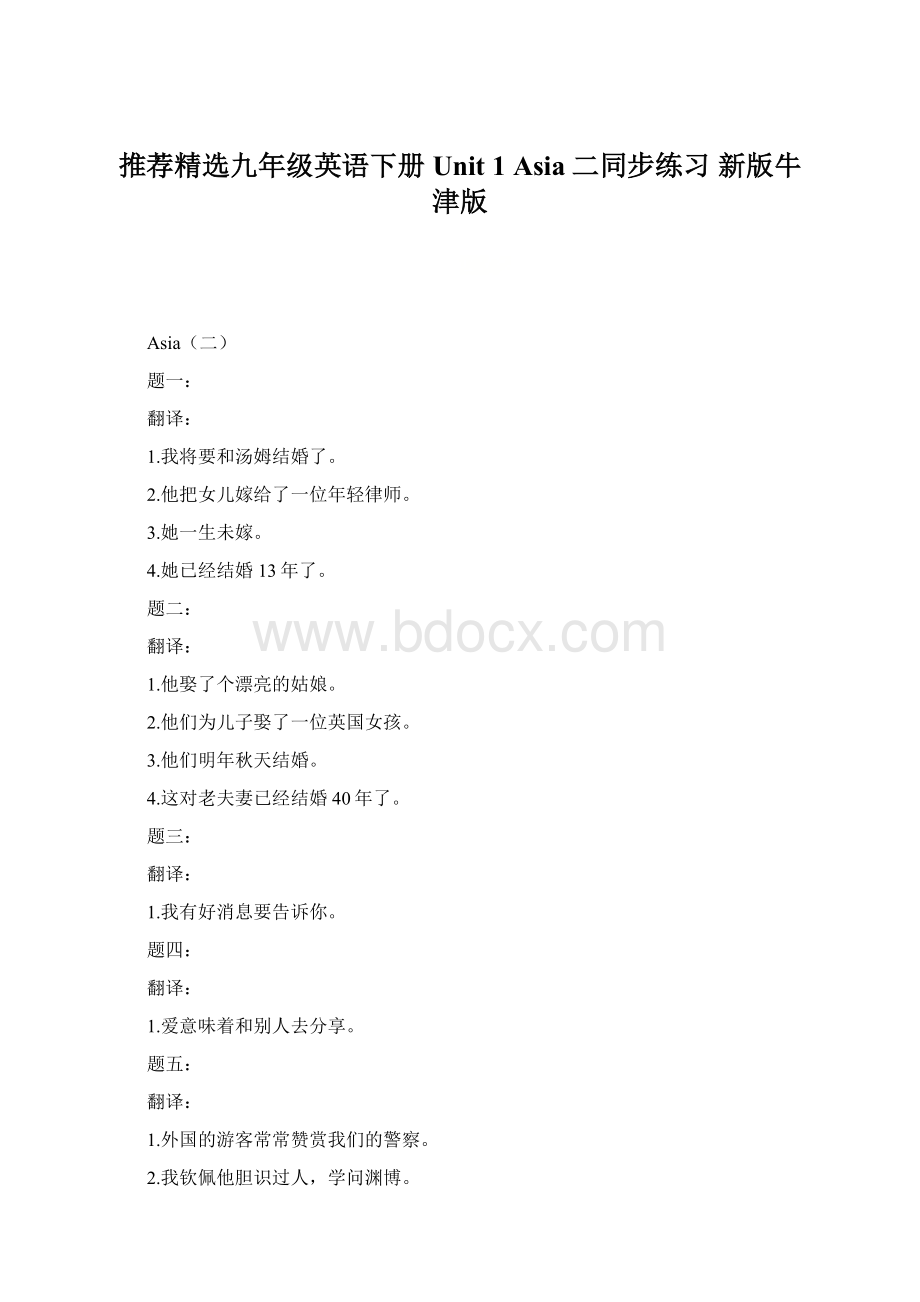推荐精选九年级英语下册 Unit 1 Asia二同步练习 新版牛津版Word文档下载推荐.docx
《推荐精选九年级英语下册 Unit 1 Asia二同步练习 新版牛津版Word文档下载推荐.docx》由会员分享,可在线阅读,更多相关《推荐精选九年级英语下册 Unit 1 Asia二同步练习 新版牛津版Word文档下载推荐.docx(13页珍藏版)》请在冰豆网上搜索。

1.他英语说得很好。
2.李明每天晚上看电视。
3.他是一名学生。
4.我哥哥在一家工厂工作。
5.他经常帮助别人。
6.我父母每星期给我妹妹十元钱。
7.张先生50岁了。
8.一周有7天。
9.如果明天天气好,我们将进行足球比赛。
题一十二:
1.约翰来自加拿大。
2.他们经常骑自行车去学校。
3.她很聪明。
4.我有一个红色的铅笔。
5.我每天六点起床。
6.迈克经常和他妹妹去公园。
7.杯子里有一些水。
8.太阳东升西落。
9.当我完成作业的时候,我给你讲故事。
题一十三:
1.学生们正在画画。
2听!
有人正在听音乐。
3.他们在上英语课。
4.你总是把重要的事情忘掉。
5.我要走了。
题一十四:
1.她在听电话。
2.看,李先生正在骑自行车。
3.他正在读书。
4.他总是玩电脑游戏。
5.叔叔下周要来看我。
题一十五:
1.今天上午我见到了林涛。
2.去年她在美国。
3.他昨天买了一辆自行车。
4.双胞胎去年住在大连。
5.上周末她去看她的阿姨。
6.他上个月经常在学校吃午饭。
7.
我要是有再多一点钱,我就买汽车了。
8.昨天下午3点我在读小说。
9.那时孩子们正在睡觉。
10.她敲门时我正在做饭。
题一十六:
1.昨天早上我在教室里。
2.昨天下午天气不热。
3.他们去年去上海旅行。
4.三小时之前我打扫的教室。
5.上周末,我的车被偷了。
6.露西在学校写家庭作业。
7.要是我知道她的电话号码,我就可以给她打电话了。
8.我们昨天下午5点正在放风筝。
9.当我们离开车站的时候,正在下雨。
10.昨天晚上七点到九点的时候我们在看电视。
题一十七:
PeterJuddwantedverymuchtobeasoldierwhenhewasachild.Sohejoinedthearmywhenhewaseighteen,andforseveralmonthshewastaughthowtobeagoodsoldier.Hedidquitewellineverythingexceptshooting.Onedayheandhisfriendswerepracticingtheirshooting,andallofthemweredoingquitewellexceptPeter.Afterhehadshotatthetarget(靶子)ninetimesandhadn’thititonce,theofficerwhowastryingtoteachtheyoungsoldierstoshootsaid,
“Youarequitehopeless,Peter!
Don’twasteyourlastbullet(子弹)!
Gobehindthatwallandshootyourselfwithit!
”
Peterfeltashamed(羞愧的).Hewentbehindthewallandafewsecondslater,theofficerandtheotheryoungsoldiersheardthesoundofashot.
“Oh,dear!
”theofficersaid.“Hasthatsillymanreallyshothimself?
Heranbehindthewallasquicklyashecould,butPeterwasallright.“I’msorry,sir,”hesaid,“butImissedagain.”
1.PeterJuddjoinedthearmyinorderto________.
A.beasoldierB.begoodatshootingC.makefriendsD.getagoodjob
2.TheofficerthoughtPeterwashopelessbecause________.
A.hedidn’tknowhowtouseagun
B.hedidn’tgetalongwellwithothersoldiers
C.hewaspooratshooting
D.hecouldn’tdoanythingwell
3.Whattheofficersaidattheendofthefirstparagraphshowsthat________.
A.theofficerreallywantedPetertodie
B.theofficerwasveryangryw
ithPeter
C.theofficerwasnotakind-heartedman
D.theofficerwasafraidthatPeterwouldshoothimself
4.Theofficerfelt________whenheheardthesoundof
ashot.
A.ashamedB.frightenedC.ex
citedD.disappointed
5.Whathappenedattheendofthestory?
A.Peterbecameagoodsoldier.
B.Peterkilledhimselfbehindthewall.
C.TheofficerwaspleasedwithPeterintheend.
D.Petermissedthetargetforthetenthtime.
题一十八:
Mr.Leewasinbedandwastryingtogotosleepwhenheheardthebellring.Heturnedonthelightandlookedathisclock.Itwastwelveo’clock.“Whocanitbeatthistimeofnight?
”Hethought.Hedecidedtogoandfindout.Sohegotofbed,putonhisdressinggown(浴袍)andwenttothedoor.Whenheopenedthedoor,therewasnobodythere.“Thatisverystrange.”Thenhewentbacktohisbedroom,tookoffhisdressinggown,gotbackintobed,turnedoffthelightandtriedtogotosleep.
Afewminuteslaterheheardthebellagain.Mr.Leejumpedoutofbedveryquicklyandrushedtothedoor.Heopenedit,butagainhefoundnoonethere.Heclosedthedoorandtriednottofeelangry.Thenhesawapieceofpaperonthefloor.Hepickeditup.Thereweresomewordsonit:
“Itisnowaftermidnight(午夜),soitisAprilFool’sDay(愚人节).Aprilfooltoyou!
“Oh,itwastheEnglishboynextdoor!
”Mr.Leeexclaimed(惊叫)andalmostsmiled.Hewentbacktobedandfellasleepatonce.Thebelldidnotringagain.
1.WhendidMr.Leegotob
ed?
Hewenttobed_______.
A.beforetwelveo’clock
B.aftertwelveo’clock
C.whenthebellrang
D.whenhesawtheboy
2.Whydidherushtothedoorwhenheheardthebellringthesecondtime?
A.Hewantedtoopenthedoorforthevisitor
B.Hewantedtofindoutwhothevisitorwas.
C.Hewasafraidofthering
D.Hewaswaitingforsomeone.
3.Fromthispassage,welearnthatwecan_______onAprilFool’sDay.
A.say“Hello”toeachother
B.danceandsingatnight
C.playjokesoneachother
D.sendpresentstochildren
4.WhatdidMr.LeethinkabouttheEnglishboy?
Hethoughthe_________.
A.wasagoodboy
B.wasfriendlywithhim
C.shouldn’tringthebellatmidnight
D.didadangerousthingjustnow
Asia
(二)
1.I
am
going
to
marry
Tom.
2.Hehasmarriedhisdaughtertoayounglawyer.
3.She
never
married
in
life.
4.Shehas
been
for
13
years.
解析:
1.marrysb.“嫁给某人,与……结婚”,相当于get/bemarriedto。
2.marrysb.tosb.“让某人与某人结婚”,一般指父母把女儿嫁给某人或为儿子娶媳妇。
3.marry作不及物动词时,常与副词early,late,well,happily,never,again等连用。
4.marry是非延续性动词,因此不能和表示一段时间的状语连用,表示结婚已有一段时间应用have/hasbeenmarried。
1.He
gotmarried
toa
pretty
girl.
2.TheymarriedtheirsontoanEnglishgirl.
3.The
yaregoingto
inthefallofnextyear.
4.Theoldcouplehavebeenmarriedforfortyyears.
3.marry作不及物动词时,常与副词early,late,well,happily,never,again等连用。
Iwanttosharegoodnewswithyou.
share…with…“与……分享……”。
Lovemeansto
sharewith
others.
sharewith…“与某人分享某物”。
1.Foreignvisitorsusually
admire
ourpolicemen.
2.I
himforhisbraveryandlearning.
1.admire“钦佩,赞赏”及物动词,后接名词或代词作宾语。
2.admiresb.for(doing)sth.“因……钦佩/赞赏某人”。
1.We
hiscourage.
2.We
themfortheirgreatsuccesses.
1.Itiscarelessofhimtolosesomanythings.
2.It
is
impossible
you
get
there
such
a
short
time.
1.It’s+adj.+ofsb.todosth.“某人做某事……”,此时形容词是用来描述人的性格、品质的词,如careful,kind,friendly等等。
2.It’s+adj.+forsb.todosth.“做某事对于某人来说……”,此时形容词用来描述不定式所表达的事物特征的词,如important,easy,hard等等。
1.It’scleverofyoutoworkoutthemathsproblem.
necessary
learn
from
1.Cotton
isplanted
widely
inthisarea.
2.This
wide
riveristheYellowRiver.
1.widely副词,“广泛地,普遍地”,常常用来描述抽象性的行为和状况。
2.wide形容词,“宽的,宽阔的”。
1.Gasis
now
usedforcookingandheating.
2.Theglasstableistoo
wide,wecan’tcarryinthroughthedoorway.
speaks
English
very
well.
2.Li
Ming
watches
TV
every
evening.
3.Heisastudent.
4.My
brother
works
afactory.
5.He
always
helps
6.Myparentsgivetenyuantomysistereveryweek.
7.Mr.Zhangisfiftyyearsold.
8.There
are
seven
days
week.
9.If
it
fine
tomorrow,
we’ll
hav
e
football
match.
1.一般现在时表示经常性或习惯性的动作或存在的状态,当句子主语为第三人称单数时,谓语动词用三单形式。
2.一般现在时主要表示经常性或习惯性的动作或存在的状态,当句子主语为第三人称单数时,谓语动词用三单形式。
3.一般现在时的常用句式结构为be(am/is/are)+表语,即所谓“主系表”结构。
4.一般现在时的常用于,主语+谓语动词+宾语,即所谓“主谓宾”结构。
5.一般现在时,常用的时间状语有:
always,usually,often,everyday等。
6.一般现在时,可用于表示经常性或习惯性的动作或存在的状态,常与表频率的时间状语连用。
7.一般现在时,可用于描述现在的情况、状态等。
8.一般现在时,可用于描述客观真理、客观存在或科学事实等。
9.在含时间状语从句或条
件状语从句的复合句中,若主句用一般将来时,则从句用一般现在时表示将来,即所谓“主将从现”。
1.John
comes
Canada.
2.They
usually
go
school
by
bike.
3.Sheisclever.
4.I
have
red
pencil.
5.I
up
at
six
day.
6.Mikeoftengoestotheparkwithhissister.
7.Thereissomewaterinthecup.
8.The
sun
rises
the
east
and
sets
west.
9.When
I
finish
my
homework,
I’ll
tell
story.
2.一般现在时主要表示经常性或习惯性的动作或存在的状态。
9.在含时间状语从句或条件状语从句的复合句中,若主句用一般将来时,则从句用一般现在时表示将来,即所谓“主将从现”。
1.Thestudentsaredrawi
ngpictures.
2.Listen!
Someoneislisteningtothemusic.
3.TheyarehavingEnglishclass.
4.You
forgetting
important
things.
5.I’m
going.
1.现在进行时表示现在正在进行的动作,其句式结构为:
主语+am(is,are)+现在分词。
2.现在进行时,常见的时态标志词为:
now,atthemoment,look,listen等。
3.现在进行时,表示目前正在进行的动作。
4.现在进行时,如果与always,usually,forever等词连用,表示说话者的赞扬、厌恶或不满等情绪。
5.一些表示位置移动的动词,如go,come,leave,fly,arrive等,常用现在进行时表示即将发生的动作。
1.Sheisansweringthephone.
2.Look!
Mr.Liisridingabike.
3.Heisreadingbook.
4.Heisalwaysplayingcomputergames.
5.Uncleiscomingtoseemenextweek.
met
Lin
Tao
this
morning.
2.ShewasinAmericalastyear.
3.Heboughtabikeyesterday.
4.The
twinslivedin
Dalian
last
year.
5.She
visited
her
aunt
weekend.
6.He
often
had
lunch
month.
7.If
more
money,
would
buy
car.
8.I
was
reading